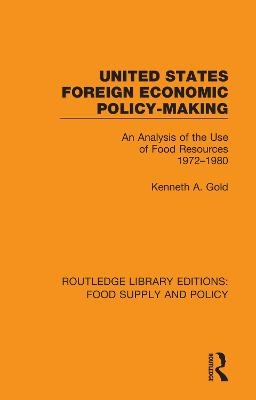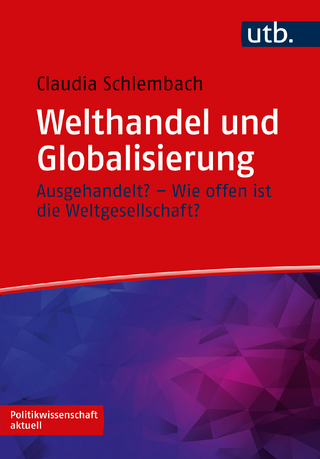
United States Foreign Economic Policy-making
An Analysis of the Use of Food Resources 1972-1980
Seiten
2019
Routledge (Verlag)
978-0-367-27578-5 (ISBN)
Routledge (Verlag)
978-0-367-27578-5 (ISBN)
This book develops an analytical framework for understanding US foreign agricultural policy through a "state interest" approach, and describes and analyses seven cases of food policy decisions through this perspective which shows that decision makers sought to utilise US food resources to accomplish foreign policy objectives.
This book develops an analytical framework for understanding United States foreign agricultural policy through a "state interest" approach, and describes and analyses seven cases of food policy decisions through this perspective which shows that decision makers sought on most occasions to utilise US food resources to accomplish foreign policy objectives. A fundamental aspect of the statist approach is the recognition that those sectors representing the interest of the state will inevitably confront other actors in the policy process who are likely pursuing conflicting objectives. This book looks at contemporary circumstances in the formulation of US agricultural policy, in particular those alterations that occurred beginning in 1972. It offers an analysis of the nature of foreign economic policy and outlines the re-emergence of economics as an important component of US foreign policy, and an analysis of the concept of "food power".
This book develops an analytical framework for understanding United States foreign agricultural policy through a "state interest" approach, and describes and analyses seven cases of food policy decisions through this perspective which shows that decision makers sought on most occasions to utilise US food resources to accomplish foreign policy objectives. A fundamental aspect of the statist approach is the recognition that those sectors representing the interest of the state will inevitably confront other actors in the policy process who are likely pursuing conflicting objectives. This book looks at contemporary circumstances in the formulation of US agricultural policy, in particular those alterations that occurred beginning in 1972. It offers an analysis of the nature of foreign economic policy and outlines the re-emergence of economics as an important component of US foreign policy, and an analysis of the concept of "food power".
1. An Analysis of United States Foreign Agricultural Policy 2. Foreign Economic Policy 3. United States Food Power 4. Food Policy Decisions Toward the Soviet Union: The Soviet Grain Transactions, 1972; The U.S.-Soviet Grain Agreement, 1975 5. U.S. Foreign Policy Toward the Allende Regime in Chile, and the 1973 Soybean Embargo 6. U.S. Food Policy Toward the Third World, 1974-75 7. The Soviet Grain Embargo, January 4, 1980 – April 24, 1981 8. Summary and Conclusions. Appendix A: Table on International Food Trade. Appendix B: Why Poor Countries Cannot Easily Increase Their Own Food Production
| Erscheinungsdatum | 07.08.2019 |
|---|---|
| Reihe/Serie | Routledge Library Editions: Food Supply and Policy |
| Verlagsort | London |
| Sprache | englisch |
| Maße | 138 x 216 mm |
| Gewicht | 512 g |
| Themenwelt | Sozialwissenschaften ► Politik / Verwaltung |
| Technik ► Lebensmitteltechnologie | |
| Wirtschaft ► Volkswirtschaftslehre ► Wirtschaftspolitik | |
| Weitere Fachgebiete ► Land- / Forstwirtschaft / Fischerei | |
| ISBN-10 | 0-367-27578-3 / 0367275783 |
| ISBN-13 | 978-0-367-27578-5 / 9780367275785 |
| Zustand | Neuware |
| Haben Sie eine Frage zum Produkt? |
Mehr entdecken
aus dem Bereich
aus dem Bereich
ausgehandelt? – wie offen ist die Weltgesellschaft?
Buch | Softcover (2024)
UTB (Verlag)
CHF 30,80
Theorie und Anwendung
Buch | Hardcover (2024)
Vahlen, Franz (Verlag)
CHF 55,70
wie sich unsere Wirtschaftspolitik ändern muss, damit wir globale …
Buch | Hardcover (2024)
Wiley-VCH (Verlag)
CHF 55,95


